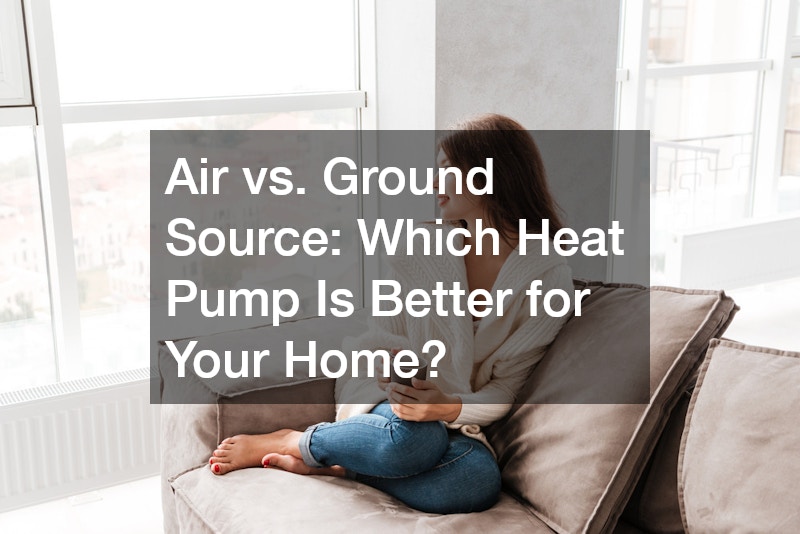These days, everyone’s talking about energy efficiency, especially when it comes to heating our homes. If you’re looking into eco-friendly options, you’ve probably come across air source heat pumps (ASHPs) and ground source heat pumps (GSHPs). Both of these systems are great for reducing carbon footprints, but figuring out which one is right for you can be a bit tricky. That’s where this guide comes in! We’ll break down the key differences in cost, installation, and energy efficiency so you can make the best choice for your home.
Understanding Heat Pumps
Heat pumps operate by transferring heat from one location to another rather than generating heat directly. This makes them a highly efficient choice for home heating.
They operate by using electricity to transfer heat from the surrounding environment, whether it’s from the air or the ground, into your home. Despite using electricity, the energy output is typically much higher than the electricity consumed, leading to significant energy savings.
Air Source Heat Pumps (ASHPs)
Overview
Air source heat pumps pull heat from the outside air, even when it’s chilly, and transfer it inside your home. They are generally easier to install compared to their ground source counterparts. ASHPs can be mounted on walls outside your home and require minimal ground work, making them a popular choice for homeowners looking for a more straightforward installation process.
Cost
One of the primary advantages of ASHPs is their lower upfront cost. Air source heat pump installation can range from approximately £8,000 to £18,000, depending on factors such as the type of unit, its size, and the specific performance requirements of the home. Since the installation is less labor-intensive, it reduces the overall cost for homeowners.
Installation Requirements
The installation of ASHPs is relatively quick and less complicated. They can often be mounted on an exterior wall, which means minimal disruption to your landscaping or home structure. However, it’s worth noting that in some regions, obtaining planning permission may be necessary before installation, especially if the unit might impact the aesthetic of the neighborhood.
Energy Efficiency
When it comes to energy efficiency, ASHPs do have some limitations. Their performance is influenced by external weather conditions; during extreme cold—particularly below -15 degrees Celsius—they may struggle to extract sufficient heat from the air. This can lead to decreased efficiency and potentially higher energy bills during peak winter months. Typically, ASHPs have a Coefficient of Performance (COP) of around 2.5, meaning they can produce 2.5 units of heat for every unit of electricity consumed.
Ground Source Heat Pumps (GSHPs)
Overview
Ground source heat pumps, also known as geothermal heat pumps, absorb heat from the ground. The earth maintains a relatively constant temperature below the surface, making GSHPs particularly effective at providing heat throughout the year. However, their installation requires significant ground work, making them a more complex option.
Cost
GSHPs represent a more substantial investment upfront, with costs ranging from £20,000 to £35,000. The wide price variation depends on factors such as the type of system (vertical or horizontal), the layout of the property, and the availability of land. While the initial investment is higher, many homeowners find that the long-term savings on energy bills make this option worthwhile.
Installation Requirements
The installation of GSHPs is labor-intensive, requiring excavation for the ground loops that will absorb heat. This can involve considerable disruption to your landscape and may necessitate extensive planning to ensure proper integration into your property. Because of this complexity, GSHPs are often better suited for new builds rather than retrofitting existing homes. Homeowners should expect a longer installation timeline, as the groundwork can take several days to complete.
Energy Efficiency
GSHPs are known for their superior energy efficiency, with an average COP of around 4. This means they can generate four units of heat for every unit of electricity consumed. Since they draw heat from the earth, which maintains a steady temperature, they operate efficiently year-round, irrespective of outside weather conditions. This consistent performance can lead to significant long-term savings on energy bills.
Which Heat Pump Is Right for You?
When deciding between an air source heat pump and a ground source heat pump, consider the following factors:
Budget
If you have a limited budget and are looking for a lower initial investment, ASHPs may be the better choice. However, if you are open to spending more initially for savings down the line, GSHPs could provide a better return on investment.
Space
Evaluate the available space on your property. ASHPs require less land and can be installed in various settings. In contrast, GSHPs necessitate considerable outdoor space for the installation of ground loops, making them more suitable for properties with ample land.
Planning Permissions
In some areas, installing ASHPs may require planning permissions, especially in residential neighborhoods. Conversely, GSHPs typically involve more extensive regulations and planning considerations due to the ground work involved.
Energy Efficiency Needs
If energy efficiency is your primary concern, GSHPs may be more advantageous. Their consistent performance throughout the year makes them a reliable choice for reducing energy consumption and costs.
Property Type
For new builds, GSHPs might be easier to implement as part of the initial construction. For existing homes, ASHPs could be more practical due to their simpler installation.
In Closing
When it comes to picking between air source and ground source heat pumps, it really boils down to what works best for you. Think about your budget, available space, and how energy-efficient you want to be. Both options are great for eco-friendly heating, but knowing their differences can help you make a smarter choice. It’s always a good idea to chat with a pro installer who can take a look at your home and give you personalized advice. With the right heat pump, you can keep your home cozy and save on energy bills for years to come!
.












